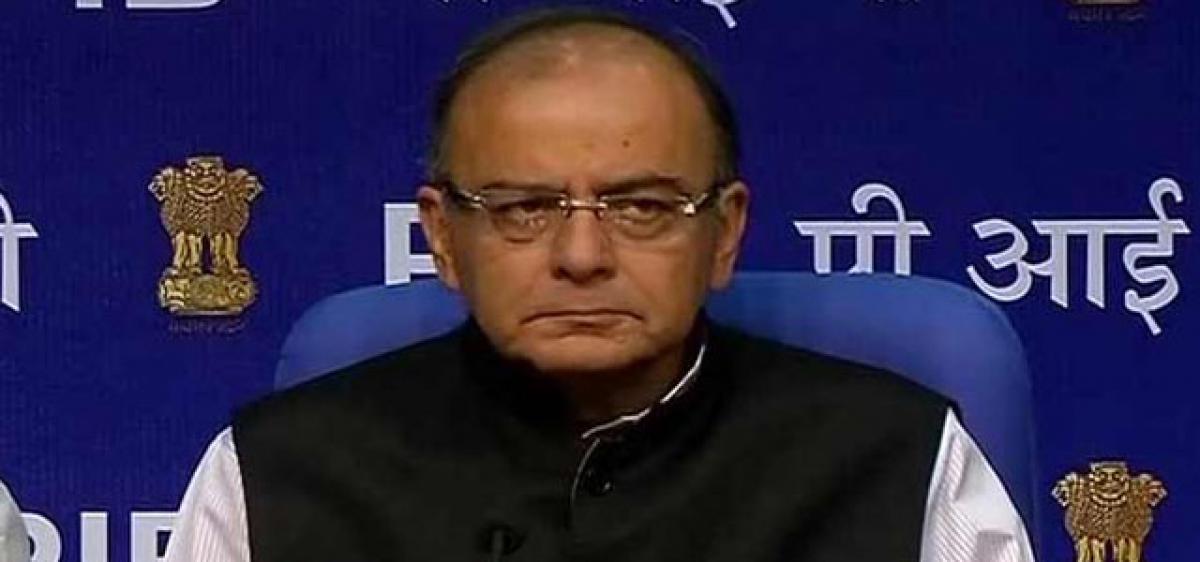Live
- Disinformation major challenge, says Pak army chief after drawing flak on social media
- Digital media platforms must curb fake news, safeguard democracy: Ashwini Vaishnaw
- BJP wants to form govt in Jharkhand to loot its natural resources: Kharge
- Germany's healthcare sector hit by skilled labour shortages
- Mallikarjun Kharge predicts INDIA bloc’s victory in Jharkhand, promises to fulfill seven guarantees
- Israel renews attacks on Beirut's southern suburbs after evacuation call
- Uzbekistan continues gas accounting, control to ensure stable supply
- Transform Anganwadi Centers into Hubs of Quality Nutrition and Education: Collector Badavath Santosh
- 'Never in history has Maharashtra slid so badly': Chidambaram faults BJP on state's economic condition
- Farmers Must Registered Livestock Details - Veterinary Doctors
Just In

Education and healthcare will continue to be exempted from tax in the upcoming GST regime that will see service tax incidence go up on telecom, business class air travel, insurance and sale of newspaper space for advertisement.
Education, healthcare exempted
Srinagar: Education and healthcare will continue to be exempted from tax in the upcoming GST regime that will see service tax incidence go up on telecom, business class air travel, insurance and sale of newspaper space for advertisement.
Transport services will be taxed at 5 per cent leading to a small drop in economy class air travel which currently attracts 6 per cent service tax. Non AC train travel, including in local trains and metro, as well as religious travel including Haj yatra will remain exempted from GST. Five per cent rate will also apply to cab aggregators like Ola and Uber, which currently pay 6 per cent tax.
HIGHLIGHTS:
- Mobile calls costly, taxi rides cheaper
- Tax on insurance, print ads to go up
- 18% tax on telecom, financial services
- Cinema tickets to attract 28% tax
AC train travel will attract 5 per cent service tax, same as freight levy. The all-powerful GST Council finalised four tax rates of 5, 12, 18 and 28 per cent for services including telecom, insurance, hotels and restaurants under the biggest tax reform since the Independence.
The rates are in line with those finalised for goods. With this, rates of all items except a handful including gold, have been decided ahead of the roll out of the Goods and Services Tax (GST) regime from July 1.
Space selling for advertisement in newspapers will attract 5 per cent levy in GST. It is exempted from tax currently. Briefing reporters here after the two-day meeting of the Council, Finance Minister Arun Jaitley said telecom and financial services will be taxed at a standard rate of 18 per cent.
Service tax on telecom like phone bill payment totals to 15 per cent at present. However, Revenue Secretary Hashmukh Adhia insisted that the tax incidence on telecom services will be unchanged at 15 per cent after the input credit is taken on equipment.
While economy class air travel will attract 5 per cent GST, the business class will be charged at 12 cent, he said. Jaitley said non-AC restaurants will charge 12 per cent GST on food bill. The tax rate for AC restaurants and those with liquor licence will be 18 per cent, while 5-star hotels will charge 28 per cent GST. Restaurants with Rs 50 lakh or below turnover will go under the 5 per cent composition, he said.
Work contracts like white washing will be liable for a 12 per cent GST. Entertainment tax will be merged with service tax under the GST and a composite 28 per cent levy charged on cinema services as well as gambling and betting at race course. While the rate proposed for cinema halls is lower than 40 to 55 per cent currently, it may not result in a reduction in tariffs on cinema tickets as states continue to hold right to levy local charges on them.
Hotels and lodges charging per day tariff of Rs 1,000 will be exempt from GST. Rate for hotels with tariff of Rs 1,000 to Rs 2,000 per day would be 12 per cent, while those with Rs 2,500 to Rs 5,000 would be 18 per cent. GST for hotels with tariff above Rs 5,000 will be 28 per cent.
Jaitley said tax on gold and precious metals will be taken up at the next meeting of the Council on June 3. GST on services was the main item discussed at the GST meet on Friday, he said, adding that most service tax exemptions will be grandfathered and will continue. Net effect of GST will not be inflationary, he said, adding that healthcare and education services will continue to be exempted from tax under GST.
E-commerce players like Flipkart, Snapdeal will have to deduct 1 per cent TCS (tax collected at source) while making payments to suppliers, Adhia said. There will be no tax on lottery. Jaitley said July 1 will be the rollout date for GST. "We are in state of readiness."
Adhia warned of industry changing rates before the GST rollout saying that under the anti-profiteering law, any entity can be called in to question for their actions. "My advice to all the big industry players would be that please don't do this. Let's be honest, let us try to pass down the actual tax rate to the consumer and let's not try to increase tariff only because of tax rate going up," he said.
Jaitley said, "As I said, we made sure that consumers don't have to pay more. The net effect of goods and services is not going to be inflationary because, once the system of input credits starts the actual incidence is going to be positively impacted," he said.
The services have been split up into 12 and 18 per cent and some 5 services in 28 per cent category, he added.

© 2024 Hyderabad Media House Limited/The Hans India. All rights reserved. Powered by hocalwire.com







